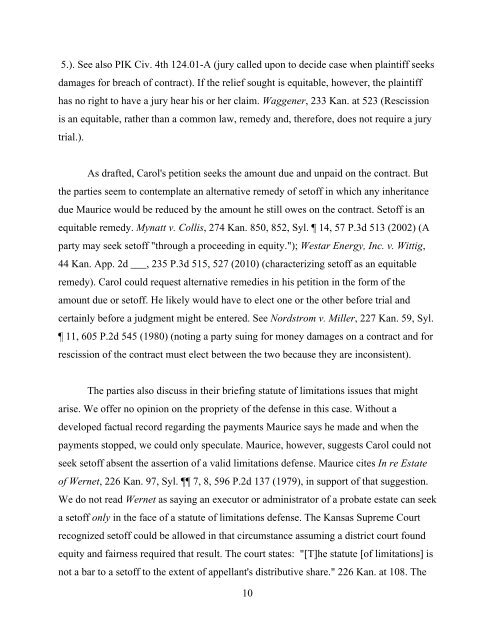103047 - Kansas Judicial Branch
103047 - Kansas Judicial Branch
103047 - Kansas Judicial Branch
You also want an ePaper? Increase the reach of your titles
YUMPU automatically turns print PDFs into web optimized ePapers that Google loves.
5.). See also PIK Civ. 4th 124.01-A (jury called upon to decide case when plaintiff seeks<br />
damages for breach of contract). If the relief sought is equitable, however, the plaintiff<br />
has no right to have a jury hear his or her claim. Waggener, 233 Kan. at 523 (Rescission<br />
is an equitable, rather than a common law, remedy and, therefore, does not require a jury<br />
trial.).<br />
As drafted, Carol's petition seeks the amount due and unpaid on the contract. But<br />
the parties seem to contemplate an alternative remedy of setoff in which any inheritance<br />
due Maurice would be reduced by the amount he still owes on the contract. Setoff is an<br />
equitable remedy. Mynatt v. Collis, 274 Kan. 850, 852, Syl. 14, 57 P.3d 513 (2002) (A<br />
party may seek setoff "through a proceeding in equity."); Westar Energy, Inc. v. Wittig,<br />
44 Kan. App. 2d ___, 235 P.3d 515, 527 (2010) (characterizing setoff as an equitable<br />
remedy). Carol could request alternative remedies in his petition in the form of the<br />
amount due or setoff. He likely would have to elect one or the other before trial and<br />
certainly before a judgment might be entered. See Nordstrom v. Miller, 227 Kan. 59, Syl.<br />
11, 605 P.2d 545 (1980) (noting a party suing for money damages on a contract and for<br />
rescission of the contract must elect between the two because they are inconsistent).<br />
The parties also discuss in their briefing statute of limitations issues that might<br />
arise. We offer no opinion on the propriety of the defense in this case. Without a<br />
developed factual record regarding the payments Maurice says he made and when the<br />
payments stopped, we could only speculate. Maurice, however, suggests Carol could not<br />
seek setoff absent the assertion of a valid limitations defense. Maurice cites In re Estate<br />
of Wernet, 226 Kan. 97, Syl. 7, 8, 596 P.2d 137 (1979), in support of that suggestion.<br />
We do not read Wernet as saying an executor or administrator of a probate estate can seek<br />
a setoff only in the face of a statute of limitations defense. The <strong>Kansas</strong> Supreme Court<br />
recognized setoff could be allowed in that circumstance assuming a district court found<br />
equity and fairness required that result. The court states: "[T]he statute [of limitations] is<br />
not a bar to a setoff to the extent of appellant's distributive share." 226 Kan. at 108. The<br />
10

















